Department "English Language"
- 5418 views
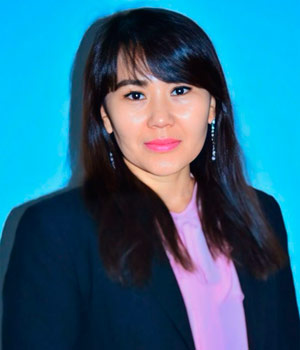
Artykbaeva Fazila Ilmarqyzy
Head of the «English Language» department, Doctor of Philosophy (PhD)
✆ Phone: +7 707-123-1681
✉ E-mail: k-filolog@tashenev.edu.kz
- Mission and purpose of the department
-
Department Mission: To provide high-quality education for future professionals within the field of foreign language education, meeting the demands of society and the labor market.
Quality Policy and Goals: The department is committed to fostering universal and professional competencies in students by actively employing innovative technologies and teaching methods aligned with current educational trends.
Department Goals: To enhance the intellectual potential of individuals within the framework of foreign language education.
Department Objectives:
Increase students' motivation to learn foreign languages.
Develop and enhance multicultural competence.
Organize and conduct scientific, practical, and creative events in foreign languages.
Develop and strengthen language competencies in a professional context.
Cultivate tolerance and appreciation for the cultural values of other countries.
Modernize the curriculum and apply contemporary technologies in the learning process.
Improve the language proficiency and teaching skills of the department’s faculty.
Expand international collaboration among faculty in research initiatives.
- About the department
-
The Department of «English Language», established in September 1998, is one of the academic departments with a rich history and established traditions. The first head of the department was an experienced teacher, scientist, Ph.D. M. S. Zhylkyshieva.
From 1998 to 2004, the department was headed by such famous scientists as Ph.D., Associate Professor Yerkibayeva G. G., Ph.D., Associate Professor Masharipov S. Z., Ph.D., Associate Professor Musabekova G. T.
In October 2004, the department was divided into the Departments of «Russian language and Literature» and «English language».
In September 2008, the Department of Languages was led by Associate Professor N.K. Zharkymbekova, and in September 2012, it was headed by Professor N.S. Mynbayev.
In September 2016, the department was led by Senior Lecturer M. Makhamatkulov.
In the 2022-2023 academic year, it was renamed in honor of Zhumabek Tashenov, and the current department was restructured as the «Philology» department, with J.N. Botabayeva.
The head of the department wasPh.D.,Botabaeva Zh. N.
Due to changes in the university's status, in August 2024-2025, the Department of «English Language» was reestablished from the Foreign Language Department as an independent unit. Dr. Fazila Ilmarovna Artykbayeva (PhD) was appointed head of the department. In October of this year, the «English Language» Department became part of the Faculty of «IT and Foreign Languages». Dean of the Faculty-Ph.D.,Botabaeva Zh. N.
All department’s members have appropriate higher education qualifications. The department is continually enriched with candidates of sciences, PhDs, teaching masters, and top graduates from major universities across the country. Senior department specialists serve as mentors for young professionals in both pedagogical and research fields. Under the guidance of experienced mentors, lecturers, and scholars, various educational and methodological materials are published. These include multimedia materials, modular courses, dictionaries, and a range of textbooks.
The department's teachers play a significant role in promoting the use of modern, advanced models for professional English language education for students. Qualified instructors work alongside international scholars to contribute to the students' future and create opportunities for young people to gain the necessary knowledge and experience.
The department is well-equipped with essential technical facilities, such as language labs, interactive boards, headsets, and resource rooms, to support effective teaching and independent study. Key rooms include:
Room 212: «Language Laboratory»
Room 315: «Country Study Room»
Room 316: «Young Scientists Room»
Room 317: «English Oral and Written Speech Practice Room»
Professional development for department members is organized at leading educational institutions in Kazakhstan and abroad. Each year, young faculty members enhance their professional qualifications at institutions such as the Abylai Khan Kazakh University of International Relations and World Languages, the Advanced Training Institute «Өрлеу», the «Advance» Training Center, and the State Language Development Institute.
- Educational programs
-
Вachelor’s degree:
6B01707-Foreign languages (IP)
6В01703-Foreign language: training teachers of two foreign languages
Master's degree:
7М01702- Foreign language: training teachers of two foreign languages
The department trains specialists in educational programs 6B01707 – «Foreign languages (IP)», 6B01703 – «Training of teachers of foreign languages: two foreign languages», 7M01702 – «Training of teachers of foreign languages: two foreign languages».
A distinctive feature of these educational programs from other educational programs is familiarization with scientific and methodological literature as a teacher of two foreign languages, taking into account the level of international standards for the formation of foreign language competencies among students, familiarization with the experience of foreign language education, its generalization, conducting experiments with the implementation of results in the educational process, organizational, managerial, socio-pedagogical a developed vision forms a personality with high thinking.
At the same time, it trains specialists who are proficient in multimedia, technical means of teaching, who speak a foreign language, who are able to apply various pedagogical technologies aimed at forming the qualities of the subject of intercultural communication, psychologically and methodically correctly building pedagogical activities.
Generally speaking, the future possibilities of the educational program are huge. Because nowadays, proficiency in foreign languages is becoming more and more important every year. One of the evidences of this is the process of globalization.6B01703 – «Training of teachers of foreign languages: two foreign languages»
Educational program 6B01703 – «Training of teachers of foreign languages: two foreign languages» (English and German (French) languages is aimed at training teachers of English, German (French) languages who have the skills of modern teaching methods, translation in the language pair Kazakh-English, English-Kazakh, Russian-English and English-Russian and media writing skills.
The main purpose of the EP: The purpose of the educational program "Training of teachers of foreign languages: two foreign languages" is to train teachers of English (basic) and one additional foreign language (French/German). In addition to in-depth knowledge of foreign languages, graduates of this program have comprehensive knowledge of various teaching methods and the ability to apply modern technologies in foreign language education. A distinctive feature of this program is the learning method of personality-oriented learning
Features of the EP: The main advantages of the program:
1) This program has no analogues in the Kazakh educational segment, as it combines in-depth study of the linguistic features of English, German (French), Russian and Kazakh languages.
2) An innovative training program will allow the graduate to master up-to-date knowledge and skills in the linguistic field
3) Students have the right to choose additional specializations, which expands career prospects in the Kazakh and international labor market.
Career and work, (field of activity)
Employment and career prospects:
- international companies;
- Government agencies;
- secondary educational institutions;
- Embassies;
- information and advertising agencies;
- language centers;
- translation bureaus.7M01702 – «Training of teachers of foreign languages: two foreign languages»
The main purpose of the EP: 7M01702 – «Training of teachers of foreign languages: two foreign languages» is to prepare a well-rounded linguist with a broad profile, with deep knowledge of two foreign languages, proficient in the methodology of conducting sociological research, able to apply modern approaches in teaching foreign languages, carry out written and oral translation and possess editing and media writing skills.
The educational program is based on the requirements of the State Educational Standard of the Republic of Kazakhstan, as well as the requirements of the modern market and employers.
Features of the EP: Upon completion of this program, graduates will be able to:
- apply knowledge of the lexical, grammatical and phonetic systems of the English language in conducting linguistic analysis;
- conduct research and project activities in the field of linguistics and other industries;
- apply modern teaching and assessment methods;
- to carry out effective communication in a multicultural environment and a multilingual environment both in English and in a second foreign language;
- possess analytical skills, decision-making skills and integrated problem solving;
- express your thoughts, ideas and beliefs based on the specifics of the audience, context, purpose and style;
- Work with various databases to search, identify and evaluate reliable sources of information;
- follow professional ethics;
Manage emotional intelligence in personal and professional relationships.
Career and work, (field of activity) Employment and career prospects:
- International companies;
- Government agencies;
- Higher and secondary educational institutions;
- Embassies;
- Research and analytical centers;
- Information and advertising agencies;
- publishing houses;
- Language centers;
- Translation bureaus.
- Teaching staff
-
The department consists of highly qualified specialists, philologists who study the actual problems of teaching methodology of linguistics, literary studies and philology subjects.
Currently, 29 teachers work in the department. Among them are 9 candidates of philology and 2 candidates of pedagogy, 1 associate professor, 1 associate professor, 13 masters, 5 senior lecturers and 4 lecturers. Faculty leading scientific, educational and educational work in the department: Ph.D. Zh.N. Botabaeva, MD, Associate Professor Amandykova S.H., Ph.D. Ergeshbaeva Sh.N., MPS, senior. teacher Islamova M.M., senior teacher Kemelova G.M., senior teacher Tursynova G.I., etc.- Artykbaeva Fazila Ilmarqyzy
- Akberdi Bidos Abutalipuly
- Aitzhanova Sara Egizbayevna
- Anuarbek Asel Abaykyyzi
- Arystan Gulzayna Askarovna
- Alimbayev Myrzakhan Tuymebayuly
- Mirzagalikova Saule Tajibaevna
- Mirzakhmedova Zhannat Zhavlanovna
- Kerimbaev Azamat Esengeldyevich
- Zhenis Arai Bauyrzhankyzy
- Onalbay Balnur Talgatovna
- Ormakhanova Gulnaz Suinbaevna
- Turlibek Asemai Nurgalikyzy
- Masatbaeva Saltanat Mukhtarovna
- Serikbaeva Sholpan Ergeshovna
- Arysbaeva Elnora Pirmuratovna
- Iztileuova Akerke Zhaksylykovna
- Islamova Muhabbat Mikhtibaevna
- Nazar Diana Beybitkhodzhaevna
- Pernebek Altynay Askarkyzy
- Kozhamkulova Aigerim Sarsenbaevna
- Kaldayakov Kosherbay Kaldayakuly
- Tursynova Guldar Ismailovna
- Tursynova Tyrna
- Methodological work
-
Educational and methodological work at the Department of" English language "is carried out based on the requirements and regulations of JSC" Tashenev University named after Zhumabek Akhmetovich". At the same time, the EMP of the department is developed using innovative teaching methods (the principle of modular training, the use of a point-rating system, a competency-based approach, etc.).In the development of educational and methodological literature ,conducting methodological seminars, conducting open classes, the main requirement is aimed at the formation and development of an information culture of students. This involves paying more attention to the development of communicative and cognitive skills.
On September 26, 2024, the international scientific seminar "Integration of Virtual Reality into the Educational Process: Prospects and Challenges of Modern Higher Education" was held, organized by the Department of English at the Tashenev University.
The seminar was attended by teachers of the Department,undergraduates and specialists of the English language working at universities in the United States, Great Britain and Russia.
The seminar was very interesting in a mixed format.
The seminar was attended by a specially invited guest, Melissa Lindsey, a language carrier from Minnesota, USA. He made a report on” Artificial Intelligence in Education".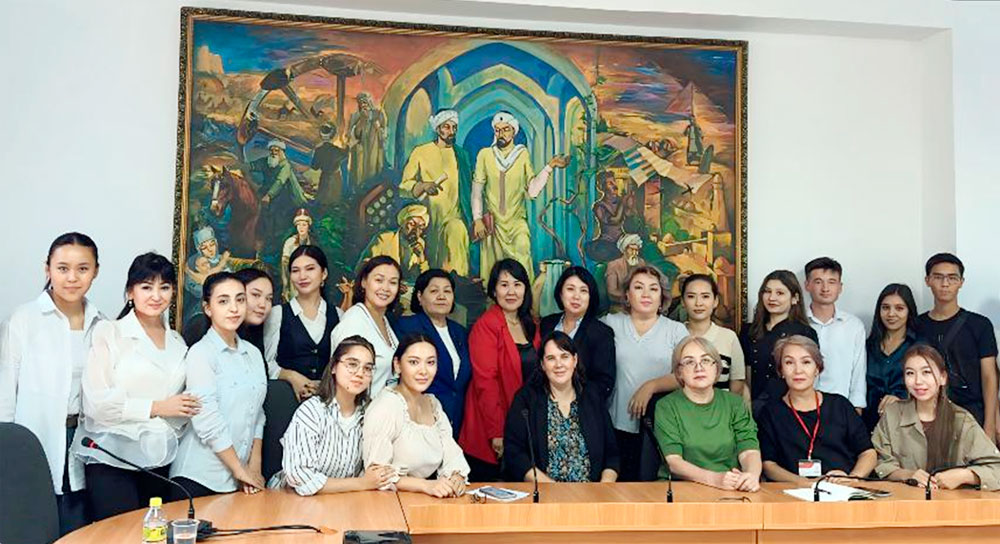
Teachers and undergraduates of the Department listened to reports and had a lively discussion. Senior lecturer of the Department Mirzagalikova S. T. After the presentation on the topic "The use of interactive teaching methods in foreign language lessons at a university", associate professor of the Department of English language and professional communication of Moscow Financial university, candidate of philological Sciences Torbik Elena Mikhailovna made a presentation on the topic "Five necessary roles of a teacher during a lesson". Okere Arnold from the British University of Business Administration Huddersfield, UK, presented a presentation on the topic "Techniques of teaching English to students" and shared his experience. They also discussed such modern topics as various innovative methods of teaching English, problems of educational opportunities of artificial intelligence, the use of the latest technologies in the field of methods of teaching a foreign language.
Colleagues actively discussed the issues of interest and combined new technologies with science in English lessons at a higher educational institution.
Information about open classes held during the academic year
22.04.2024 teacher G. S. Ormakhanova conducted a practical lesson for FC-23-1k2 groups on the topic "Traditions of English speaking countries" in the discipline "English language" in 304 classrooms. The number of students who should attend is 25. the number of students who attended is 25. the time is 10.30. the practical lesson was very interesting , students constantly asked questions to the teacher on the topic.The lesson has reached its level. The teacher has UMKD.
04.03.2024 teacher Arystan G. A. in the classroom 207 with the group Phi-22-9k2 H. 13: 30 in the discipline "basic foreign language" "Adjective. Classification of adjectives Forms of adjectives". Arystan G. took into account the regularity of the development and implementation of thinking, controlling the attention of students. During the lesson, he organized the activity of students , coordinated mass ,group, collective work for the lesson. He used his time wisely.The teacher revealed the practical need for theory, taught students to apply the acquired knowledge in practice.At each stage of the lesson, he used didactic materials.
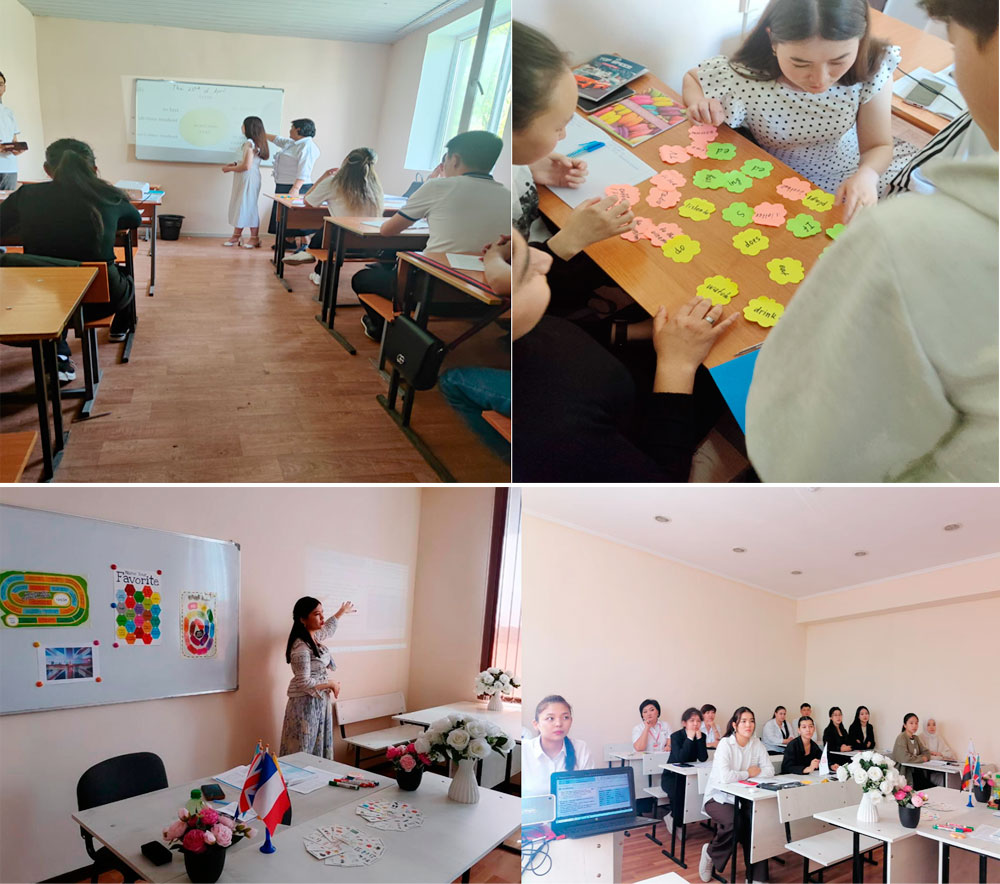
- The scientific direction
-
The scientific direction of the department «Relationship between language and culture, study of influence of cultural aspects on language and communication» is defined taking into account the main directions of research work of the university. The research activities of the department are aimed at expanding scientific knowledge in the field of language and communication, as well as improving new methods and approaches to teaching and teaching foreign languages and studying current problems in linguistics, linguistics.
The department consists of highly qualified specialists, philologists studying modern problems of linguistics and language in the paradigm of human potential of the 21st century: translation and connection of studied languages with world literature. Research work of the students of the department is carried out in accordance with the Strategic plan of the university and the department. There is a student scientific circle in English "Empire of Knowledge", based on the interests and directions of students: twice a month «Movie club», twice a month «Conversation club» for the students of the educational program 6B01703 - «Training of foreign language teachers: two foreign languages». Head of the club: master teacher Mirzakhmetova Zh.
Student circles play an important role in obtaining higher education, providing students with additional opportunities for learning, development and social activity. Student circles contribute to the comprehensive development of students and complement educational experience extra the curriculum.
The teaching staff of the department regularly participates in seminars and international and regional conferences organized in the republic and abroad, establishing close relations with domestic and foreign partners
On September 18, 2024 the department "English Language" and the department of postgraduate education jointly organized an online telebridge during the work of the XXIV International Scientific Conference "Language and thinking: psychological and linguistic aspects" with the participation of scientists of Moscow State Pedagogical University.
During the telebrige teaching staff of the department exchanged experiences with Moscow colleagues, discussed actual issues of language and teaching. The head of the depatament PhD Artykbaeva F. I. read a report on her research work, discussed psycholinguistic research in the field of theory of consciousness and intercultural communication, undergraduates asked questions about foreign education, listened to scientists' concepts. Telebridge has become a lively discussion.
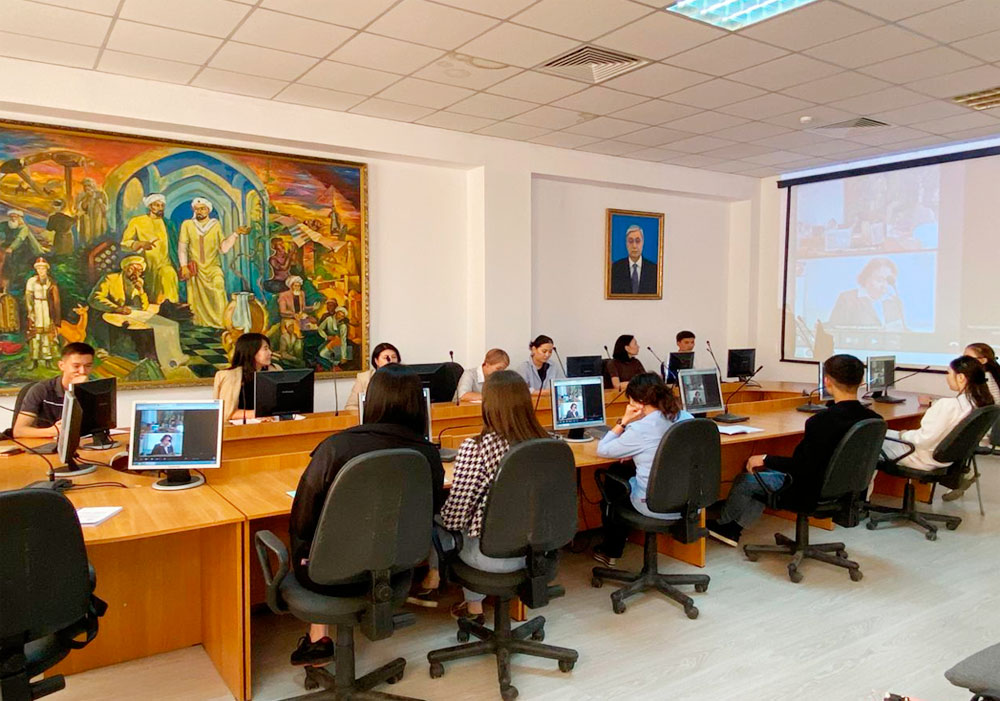
- Academic mobility
-
Academic mobility program is one of the directions of development of Zhumabek Tashenev University. Currently, the university is successfully implementing external and internal academic mobility programs.
The academic mobility program provides internal and external mobility. The academic program of internal mobility introduces learners, students of partner higher educational institutions with information about study conditions.
In order to solve such tasks, the main plan is to establish permanent scientific contacts with foreign higher educational institutions, centers, and scientific organizations in the "English Language" department. In the framework of this goal, teachers, graduate students and students annually complete scientific internships and supplement their knowledge with achievements in foreign science and practice. At the same time, the effectiveness of the faculty member's trip abroad is not only an opportunity to improve the qualifications of teachers, but they also have the opportunity to share their experience at the department, faculty level, develop new courses, activate and develop their scientific interests.
In cooperation with the academic mobility department, according to the work plan of the department, Irsaliyeva Nulifar from Phi- 23-9k3 group and Izzatullaeva Gulzoda from Phi- 23-9k4 group were sent to Tashkent State Pedagogical University named after Nizami. Fayzyrahman Araylim from the Phi-23-9k4 group had the opportunity to study in the autumn semester at Alfaraganus University in Tashkent.
- Practice bases
- The main purpose of teaching practice is- formation of professional skills of teachers of a foreign language in practical activities based on theoretical training in psychology, pedagogy and methodology of teaching foreign languages and on the basis of the analysis of the educational process in a particular educational institution and generalization of positive pedagogical experience.
Industrialpractice is aimed at implementing the theoretical knowledge and improves practical skills of work in preschool institutions, comprehensive schools, boarding schools, gymnasiums, lyceums, sports schools, colleges and other educational and specialized institutions for teaching professions.
In the formation of practical programs, their organization, an important role is assigned to corporate partners and employers. The practice programs reflect the goals, objectives of the practice, the competences formed, the main content of the practice and the requirements for the reporting documentation, the evaluation criteria. Bases of practice are defined in accordance with concluded agreements with institutions, organizations and enterprises.
Professional practice is a compulsory component of professional training programs 6В011703 - "Foreign language: two foreign languages" and is aimed at consolidation of theoretical knowledge and practical skills. In the process of development of students educational, production and predegree practices
The aim of the practice is: getting the students of primary professional knowledge; the consolidation, development and improvement of primary theoretical knowledge acquired by students in learning 1 course; the acquisition of vocational skills in the specialty. For training practice allocated 2 credits, which are developed within one week.
The purpose of the industrial practices are: consolidation and deepening of theoretical knowledge, the formation of sustainable professional competences, formation of abilities independently and efficiently perform tasks and make informed decisions, the collection of empirical material for the preparation and writing of final qualifying work, strengthening of motivation to professional activity. As well as the acquisition of practical skills, improving the quality of training, strengthen the knowledge of past disciplines, the acquisition of experience in secondary schools. Of internship 4 credits provides delivery within 10 weeks.
The goal of pre – diploma practice- improving skills of research work, registration of results; and the development of skills for teaching and scientific qualification works of nature; preparation of materials for the thesis. 2 credits externship developed within 5 weeks.
Bases educational, industrial and predegreepractice are:
1. Linguistic grammar school №26 named. Zhambyl;
2. School №14 named after Aybek
3. School number 90
4. School № 18 named after ShUalikhanov
5. School No. 6 named after J. Balasagun
6. School №17 named after M. Y. Lermontov
7. School №4 named after Kh. Dosmukhamed
8. School № 24 named after S. Erubaev
9. School № 111 named after M.Mametova
10. School № 135
11. School-Lyceum №41
12. Basic secondary schoolnamed after N. Turekulov
13. School-gymnasium № 38 named after Ondasynov
14. School № 23 named after Z.Kosmedyanskaya
15. School-gymnasium № 1 named after A.S.Pushkin
16. South-Kazakhstan pedagogical College
The program of professional practice (educational, industrial and pre-diploma) is obligatory subject of discussion at faculty meetings.
Base practices meet the requirements of the educational program, practice heads are appointed by experienced teachers of the Department and representatives of organizations. The practice provides consultation, familiarity with the base practices, the definition of supervisors, participation in the work of practice base, preparation of reporting documentation.
At the end of practice, students are on the appropriate Department report, which is checked by the supervisor and is protected before the Commission at the Department. Results protection report estimated differentiated offset by fixed point-rating alphabetic system of evaluations and shall be heard at the final conference.
In order to coordinate the preparation of specialists taking into account requirements of the employers, taken in the labour market, improving the efficiency of training and research work, organization of professional training of the employees and teachers as a form of integration of education, science and production, improvement of efficiency and strengthening of the relationship of structural units of the University with innovative organizations and enterprises to ensure the development of material-technical and experimental-production bases of scientific and innovative units developed educational-production complex, specialty "6B011703-Foreign language: two foreign languages" , on the basis of linguistic grammar school №26 named after Zhambyl (Shymkent).
Part of the (ESPC) included the Department of language disciplines of philological-pedagogical faculty, UKU, joint research units, including the student design Department, working on a joint for the University and the enterprises ' programs and plans.
During the training, industrial, pre-diploma practices, students of the specialty "6В011703-Foreign Language: Two Foreign Languages" showed themselves actively, the students managed to show their theoretical knowledge in practice, they were awarded letters of thanks from the school leadership for active participation in school activities.
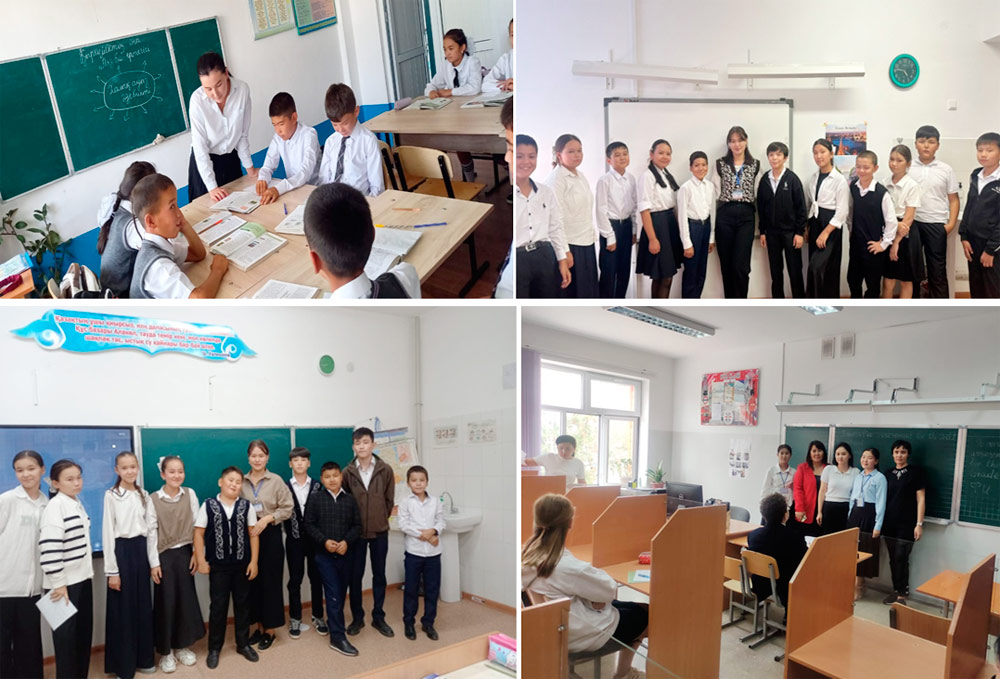
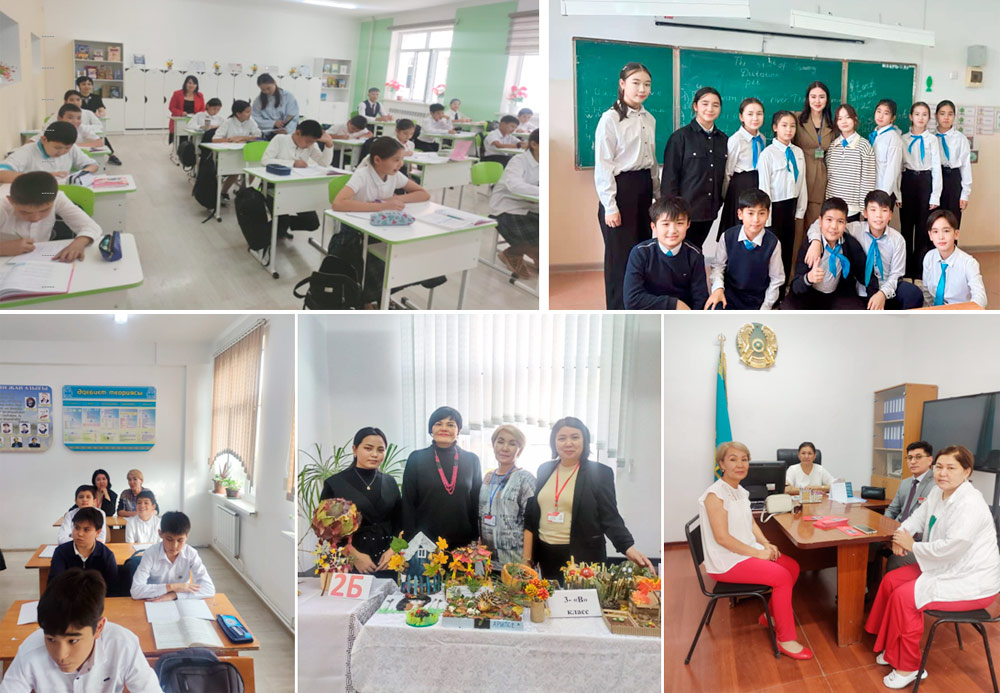
- Educational work
-
Educational work of the Department of Foreign Languages.
The main goal of the educational activity of the department is to involve students in purposefully organized activities that contribute to the realization of their intellectual, moral, creative and physical potential, and contribute to the formation of a comprehensively developed and harmonious personality. creating conditions for the formation of a professional and socially competent personality of a student with creativity, scientific worldview, high culture and civic responsibility.
The general goal of education is achieved by solving the most pressing problems:
• educating socially healthy young people by training highly qualified specialists;
• formation of safety culture and healthy lifestyle;
• forming the system of values and worldview of students, increasing the sense of patriotism and civic responsibility;
• increase the managerial competence of students;
• creating conditions for systematically identifying socially active young people, promoting their further development and internal growth;
• coordination of national and inter-ethnic (international) relations;
• development of students' respect and interest in education, intellectual creativity, teamwork;
• formation of students' culture and development of creative potential;
The main activities for solving the above-mentioned tasks are defined in the University Development Strategy for 2022-2025.
In accordance with the educational plan of the university, educational activities are actively conducted in the department.
The leading directions of work with students in all educational programs of the department have been determined. The following vectors were prioritized:
1. Civic-patriotic and legal education.
2. Providing spiritual and moral education.
3. Vocational and labor education.
4. Formation of religious tolerance.
5. Physical education and formation of a healthy lifestyle.
6. Environmental education.
7. Development of intellectual and communicative culture.
8. Cultural-aesthetic and multicultural upbringing.
9. Development of the system of student self-management and youth initiatives.
Curators, elders and group activists are appointed in all academic groups.
• The academic year 2022-2023 began with a solemn celebration of Education Day. At the ceremony, first-year students were presented with the symbolic attributes of first-year students - the Key of Education and a student card.
• On September 30, students of the department prepared a festive party called "Teacher - value" dedicated to Teachers' Day, dedicated to the professional holiday of teachers.
• On October 21, as part of the celebration of the Republic Day, students and members of the department held a festive party of the university.
• As part of the republican competition, the "Philology" department held an essay competition on the topic "Kazakhstan in my dream" among university students and undergraduates, and the winners and prize-winners were determined.
• On the occasion of the Independence Day, which is celebrated in the Republic of Kazakhstan on December 16, students of the OP "Training teachers of Russian language and literature" "Independence, peace and stability", "I praise you, my. Kazakhstan".On October 17, 2022, the Ministry of Higher and Secondary Special Education of the Republic of Uzbekistan and the Tashkent State University of the Uzbek Language organized an international subject online Olympiad on the Uzbek language and literature among foreign students of higher educational institutions. and literature. Alisher Navai. The International Olympiad was held at a very high level! Today, it is no exaggeration to say that the attractive Uzbek language has united representatives of different nationalities from all over the world!
Students of higher educational institutions from more than 10 countries of the world and foreign students studying in Uzbekistan took part in the Olympiad. Tasks consisted of 2 types: writing an essay based on a picture and oral conversation. The knowledge of the participants was assessed by foreign and Uzbek scholars who are specialists in the Uzbek language and literature.
In a sincere and friendly spirit, as well as demanding tests, students willingly participated and achieved high results. Participants won individual and team competitions and received I, II, III degree diplomas.
We are very happy that the students of our university named after Zhumabek Tashenev actively participated in the Olympiad and their work was highly appreciated. Winners of the competition: 4th-year students of the educational program "Training of foreign language teachers: two foreign languages" Aigul Amanova (1st place), Mardona Makhsatova (1st place), Zulaiho Sobirova (2nd place), overall, the team won 3rd place in the team competition ( mentor Shahlo Naraliyeva).
We thank all the organizers! We hope for further fruitful international friendly cooperation!
- Raising the qualification
-
Report on professional development according to the schedule of the teaching staff of the Department of Foreign Languages for the 2023-2024 academic year.
Approved plan:
1. Senior lecturer G. S. Ormakhanova completed an 80-hour refresher course on the course "technologies for working with students with special educational needs in inclusive education." LLP Institute of Additional Education "Orleu" Almaty. 05.10-2023-20.10.2023, the registration number of the certificate No.230510-0010-279.
2. During the period 05.10-2023-20.10.2023 completed a course of 80 hours in the educational center "promotion" of advanced training in the course "Аdvanced training of professional and communicative competence of a foreign language teacher":
1.Aitzhanova Sarah Egizbaevna No. 20230510-0010-251.
2. Yusupova Guzal Tajikhanovna No. 20230510-0010-249.
3. Nazar Diana Beibitkozhakyzy No. 20230510-0010-250.
4. Arysbaeva Elnora Pirmuratovna No. 20230510-0010-248.
5. Turgynbaeva Zhazira Makulbekovna No. 20230510-001-252.From 29.01 to 10.02.2024, they completed a 72-hour advanced training course "Digital Literacy" organized by the Institute for Advanced Training of the Zh.A. Tashenev University:
1. Botabaeva Zh.N. No.0014
2. Tursynova G.I. No.
3. Umaralieva M.A. No.0013
4. Serikbayeva Sh.E. No.0057
5. Akberdi B.
6. Nazar D.B. No.
7. Arysbaeva E.P. No.0015
8. Arystan G.A. No.0004The teaching staff of the department unscheduled a 90-hour training course from the training center "International Summer School-2023 of Auezov University" from June 19 to 30 and received a certificate:
1. Botabaeva Zh.N. No.5402
2. Tursynova G.I. No.5677
3. Ormakhanova G.S.No.5683
4. Umaralieva M.A. No.5403
5. Aidarbekova A.S. No.5405
6. Kemelova G.M. No.5404
7. Tursynova G.I. No.54068. Yusupova Guzal Tajikhanovna took part in the 72-hour training course "Digital Technologies in English language teaching" from November 22 to 29 and received a certificate from the Kazakh University of International Relations and World Languages named after Abylai Khan.
According to the plan approved at the department in October
- Social and educational activities
-
Students of the specialty"Foreign Language: two foreign languages" actively participate in National, City, and all university events.
The importance of spiritual and moral education, the socio-political level and international spirit of younger students, interethnic friendship, the humanistic approach to the formation of moral standards, the direction of public life of believers. In the process of holding the following events at a high level in this direction.
Involvement of students in the fight against corruption is recognized as one of the most effective anti-corruption tools. Mentoring hours were held that only in interaction with society it is possible to bring all guilty persons to justice and contribute to the Prevention of corruption.
On September 23, 2024, Deputies of the Senate and Mazhilis of the Parliament of the Republic of Kazakhstan met with young teachers and active youth at the Tashenov University, where they discussed the issues set out in the address of the head of state.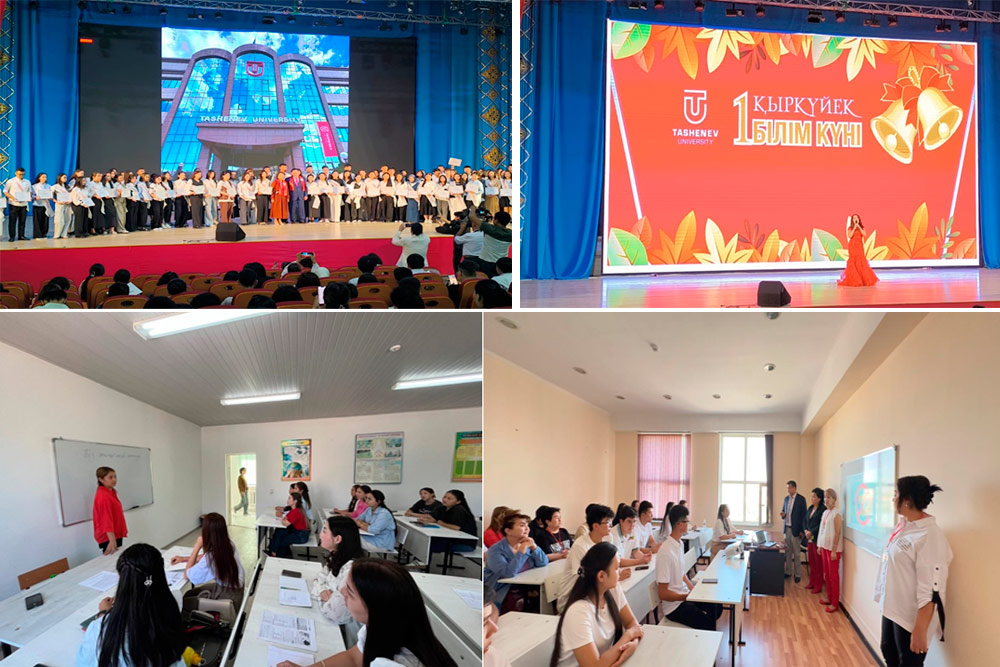
- The Student Scientific Society (SSS)
-
The Student Scientific Society (SSS) called "Future Leaders League" is a scientific social club designed for students of the English Language department interested in social-scientific life of the university. Its members actively participate in university research activities and in sessions of scientific-methodological and student linguistic social clubs each year. Students showcase their knowledge at various local and national competitions, including the Republican Subject Olympiad in Almaty, the annual International Olympiad for schoolchildren and students in Antalya, and others. The university annually hosts the student scientific conference “New Kazakhstan and Students' Scientific Creativity,” involving the most active and research-driven students.
Additionally, the department offers social clubs aimed at developing students’ socio-cultural and linguistic skills: the Movie Club and Conversation Club. In the Movie Club, students can enjoy foreign cinema once a month, discuss popular series, and participate in large-scale holiday events like Happy Halloween, Christmas Party, Valentine’s Day, and Victory Day. These events allow students to also demonstrate their leadership and organizational skills. In the Conversation Club, students, along with international participants from English-speaking countries such as the USA, England, New Zealand, Germany, and the Netherlands, practice everyday and public speaking in formats like TedTalks, Toastmasters, roundtables, workshops, webinars, motivational speeches, stand-ups, and debates. This experience fosters mutual respect in a multicultural society and encourages positive cultural exchange.
The club organizes a variety of activities, including the roundtable “Professions of the Future,” the quiz “Who Wants to Be a Millionaire,” the debate “Cultural Differences,” and the celebration of the national holiday “Nauryz Fest,” where students demonstrate their knowledge and introduce international students to the richness of national culture. These activities help unite students striving to expand their horizons in philological sciences, as they develop not only their linguistic and literary skills but also learn the art of public speaking, how to engage in scholarly discourse, and how to prepare and present scientific works. Students are also trained for participation in academic and practical conferences.
In addition, public, political, and legal issues, as well as international and patriotic education, are given attention. Teachers and students take part in national, regional, and city-wide events dedicated to significant dates, such as Kazakhstan Independence Day, Constitution Day, City Day, and thematic meetings discussing issues concerning modern youth and citizenry.
To deepen students’ knowledge of their homeland, curators organize excursions to historical sites in the South Kazakhstan region, such as Sayram, Arystanbab, and Turkestan.
Students are constantly learning the rules of conduct in a multicultural community, respecting the uniqueness of each language and the culture of its speakers residing in Kazakhstan, and studying the Law on Languages of the Republic of Kazakhstan and its areas of application.
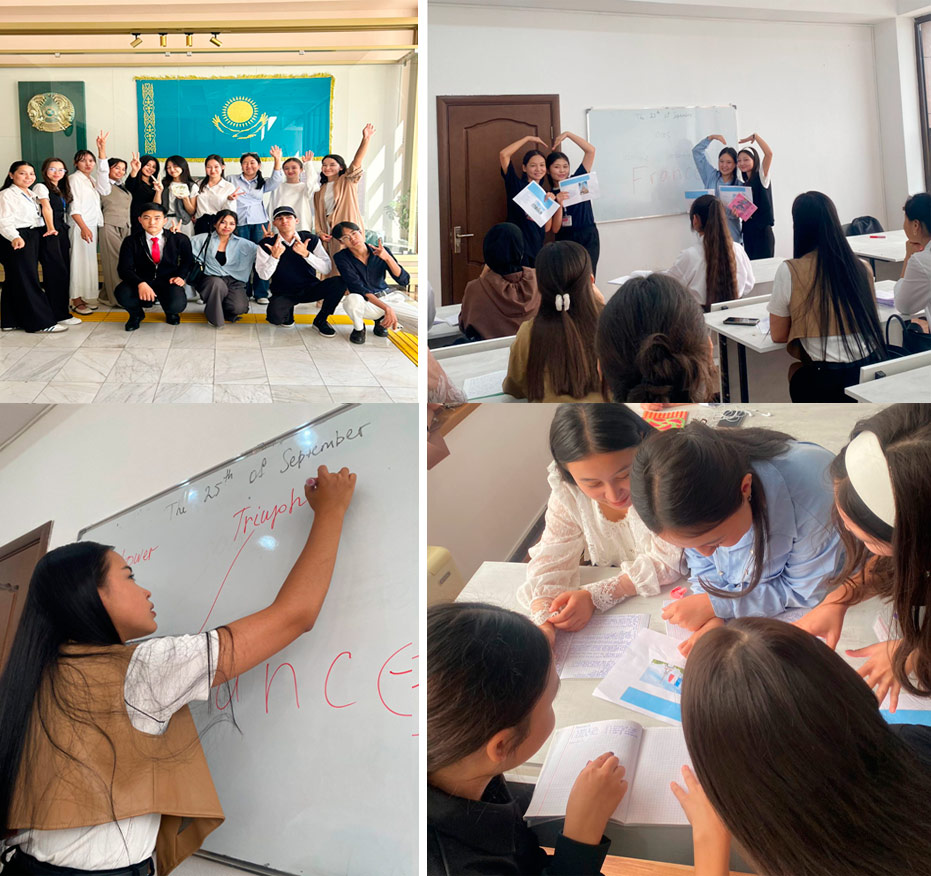
- Career guidance
-
Career guidance work at the department is focused on two areas: attracting applicants and helping graduates find employment, and is aimed at developing the professional self-determination of students.
The department participates in organizing open days and specialized fairs for employers of schools and colleges, holds open days, and organizes field work in regions and cities. Such activities are aimed at reaching a wide range of students in urban and rural areas.
The main task of career guidance work is to inform applicants about the directions and specialties of the university, employment opportunities and additional professional education. The optimal option is for a career guidance program at a university to take into account not only the recruitment of applicants and support for graduates, but also the intermediate period - the professional development and self-determination of students.
Regular monitoring of the labor market helps to better understand the needs and requirements of employers and find their compliance with the competencies of graduates. This not only improves the university’s interaction with industry employers and companies, but also increases the chances of graduates getting a job in their specialty.
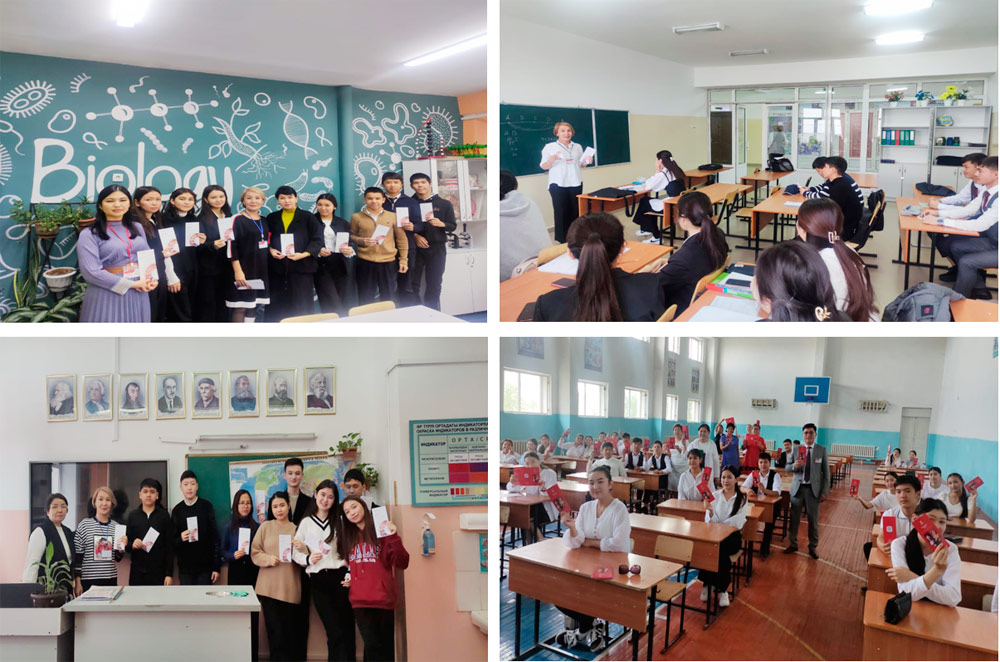

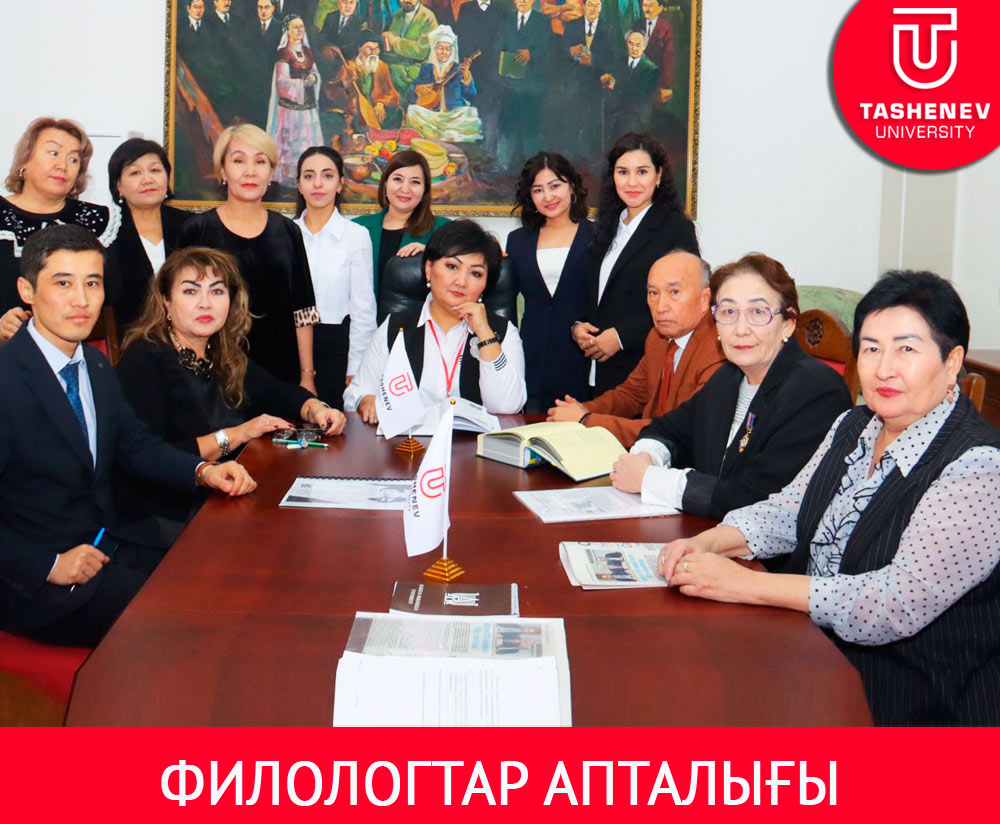
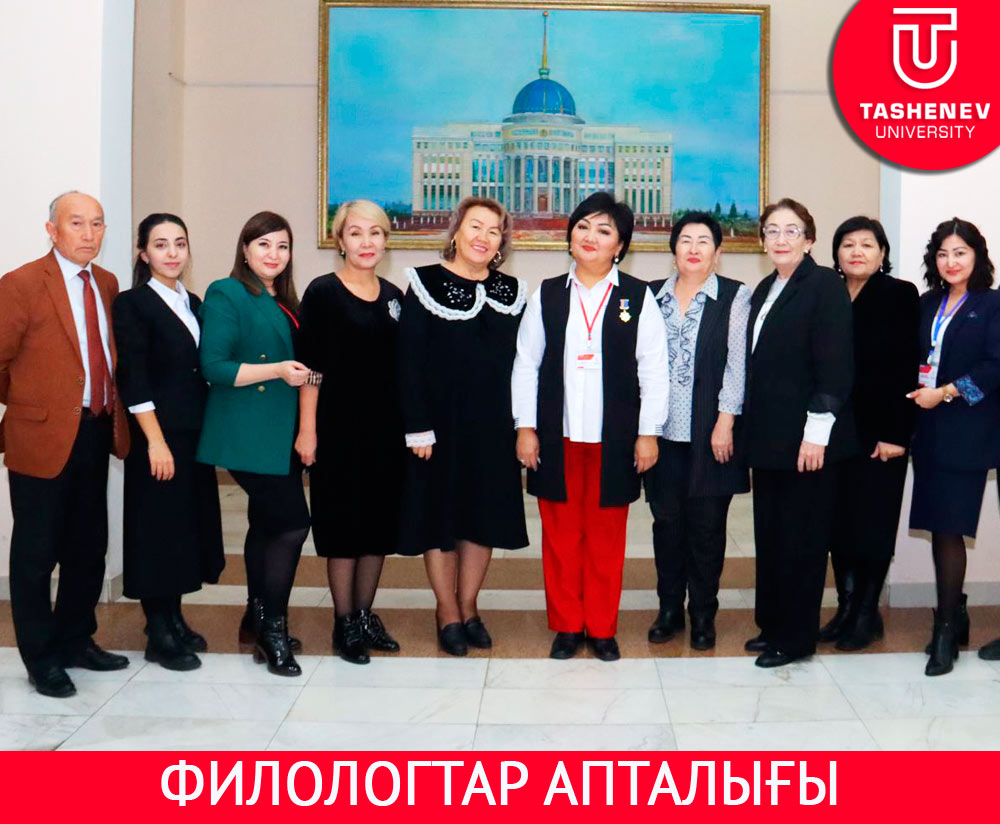
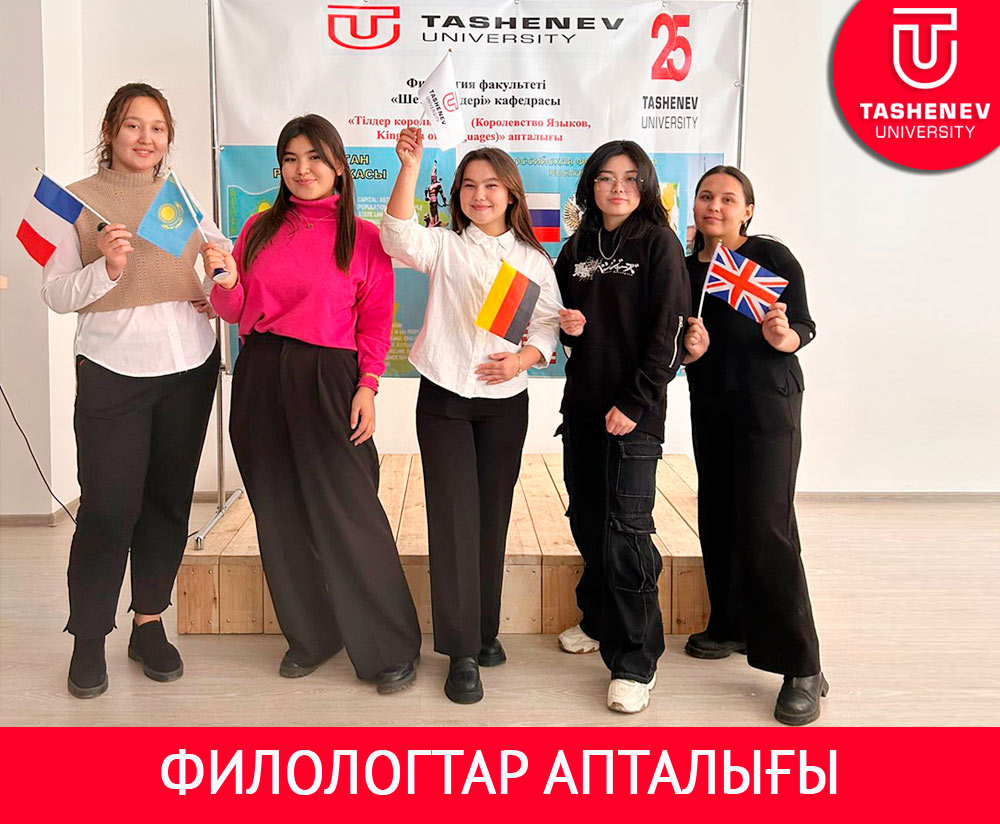
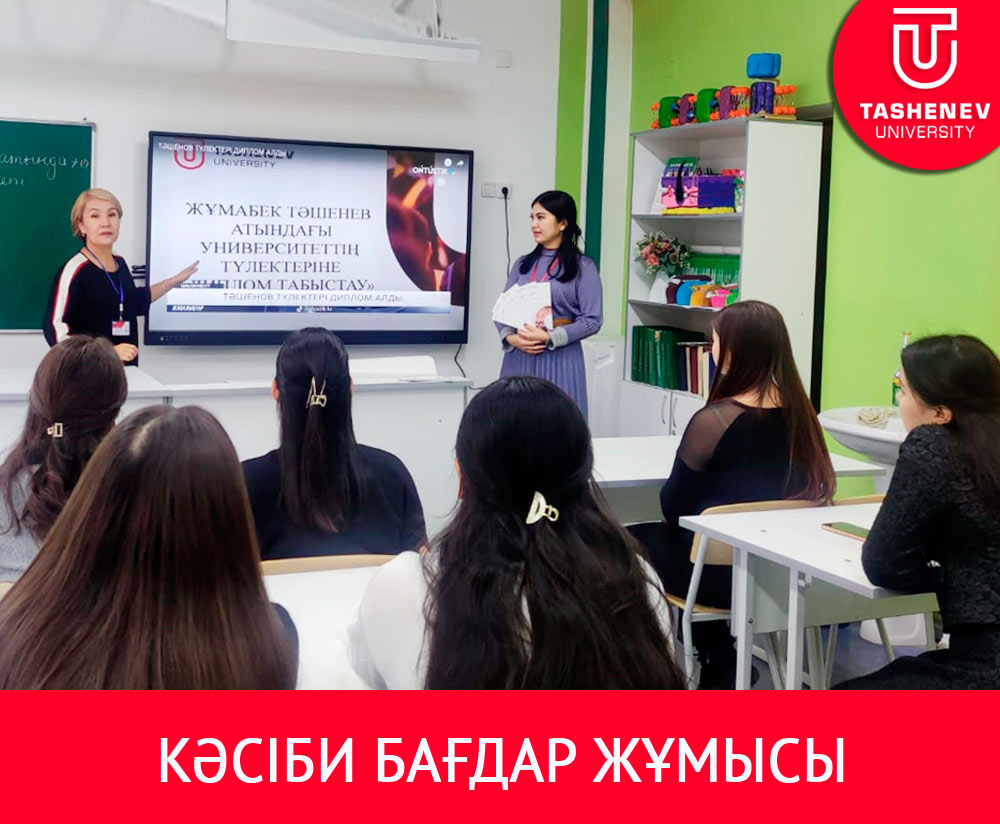
Add new comment